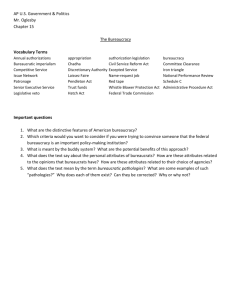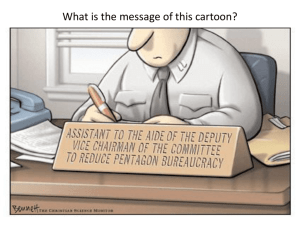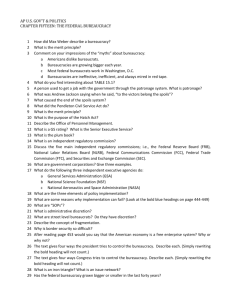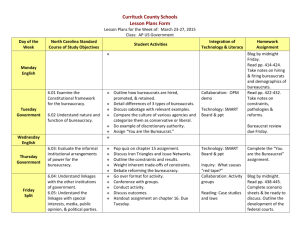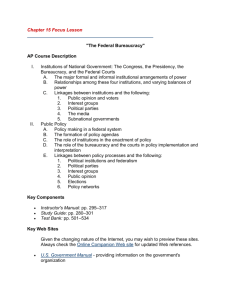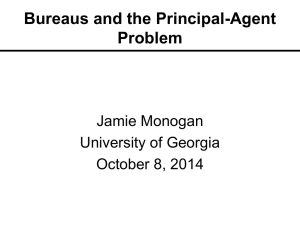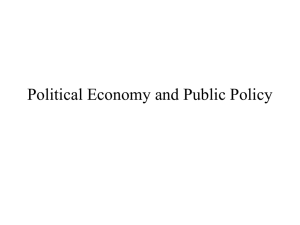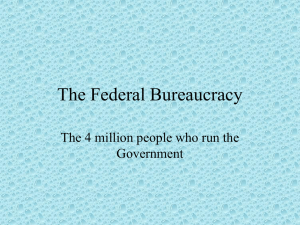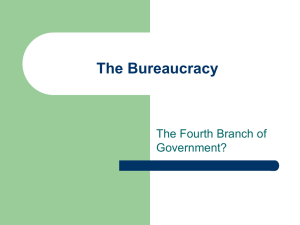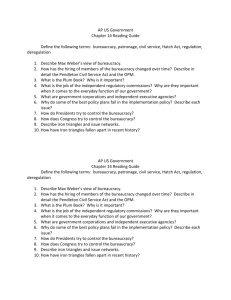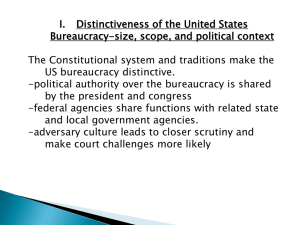File
advertisement
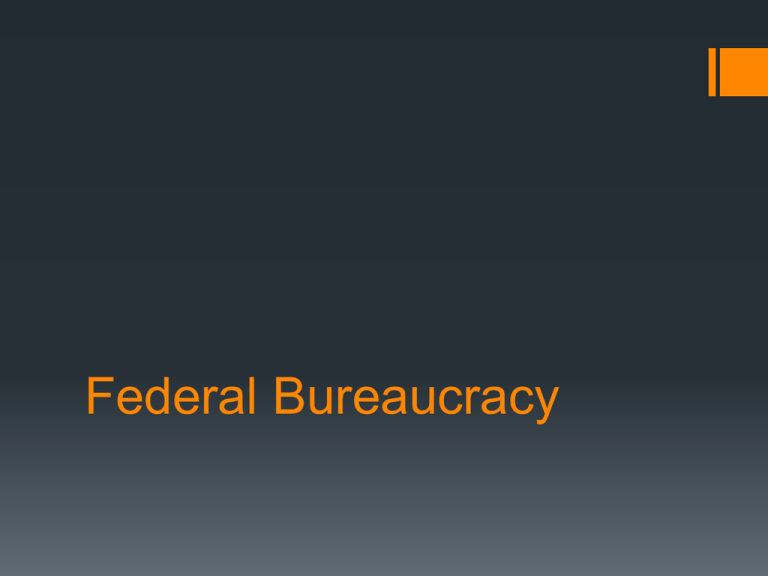
Federal Bureaucracy What is it? Bureaucracy A large organization in which people with specialized knowledge are organized into a clearly defined hierarchy of bureaus and offices, each of which has a specified mission. Bureaucracy Public agencies that translate the intent of democratic institutions into action. Why is it needed? Ability to organize large tasks Concentration of specialized talent Who is it? Most demographically representative part of government. Diversity of jobs mirrors the private sector. Figure 15.2 Who is it? Spoils System (patronage) dominated the 19th and (most of the) 20th century bureaucracy. Pendleton Act (1833) Established civil service commission This group writes tests/exams and creates requirements for promotion based on merit Merit System: people hired & promoted on basis of qualifications & job performance, not political connections. AKA Civil Service System Who is it? Office of Personnel Management (OPM) conducts most bureaucratic hiring Other bureaucratic jobs Schedule “C” jobs: jobs just below cabinet Name-Request Jobs: job created for someone in particular based on a particular skill or ability The Other Route to Federal Jobs: Recruiting from the Plum Book Who is it? Lists the very top jobs available for Presidential appointment. Presidents work to find capable people to fill the positions. Some plum jobs (ambassadorships) are patronage • 15 Cabinet Who is it? Level Departments Who is it? Also includes: Independent Executive/Regulatory Agencies CIA, EPA, FCC, FTC, Federal Reserve Bank Heads of these are somewhat independent because they cannot be removed by the President Government Corporations Post Office, AMTRAK, NASA(?) Other Government Entities Library of Congress, Government Printing Office What do Bureaucrats do? Disburse Money/Services US DOE Student Loans USDA farm loans Section 8 housing (HUD) Veterans Affairs assisstance Social Security IRS Refunds Small Business Administration Loans Clarify laws through Rulemaking What do Bureaucrats do? What do Bureaucrats do? Clarify Laws through Rulemaking Georgia General Assembly passed a law requiring specific graduation requirements Georgia Department of Education researches, writes, seeks public opinion for, and enacts the Georgia Graduation Rule (1604-2) What do Bureaucrats do? Regulate Businesses Similar to rulemaking but regards rules made to protect public health, safety, economic stability, etc FDA and rules concerning chemicals in food/make-up etc FDIC tells banks what kinds of activities they may engage in with customer’s money Equal Employment Opportunity Commission’s enforcement of fair hiring practices EPA sets pollution requirements DOT Rule forces states to set 21 as drinking age to get $ FCC censors what can and can be shown on ads Department of HUD gives economic incentives for “green” buildings FDA Requires Coca Cola to list ingredients NY Taxi & Limo Commission sets license requirements Food vendors have to pass national and state health Trends in Bureaucracy Large growth in scope and physical size since 1930’s New Deal programs Public support for increased government 1970’s “Golden Age” of rulemaking Increased environmental concerns Nixon/Congress struggles Ford/Carter weak executives Who controls Bureaucracy? Dual control Congress controls budget President controls appointments and agenda (to some degree) Interest Groups also use resources lobbying for favorable legislation Figure 15.5 Iron Triangles Issue Network Similar to iron triangle, but also includes think tanks, press, voters, etc
